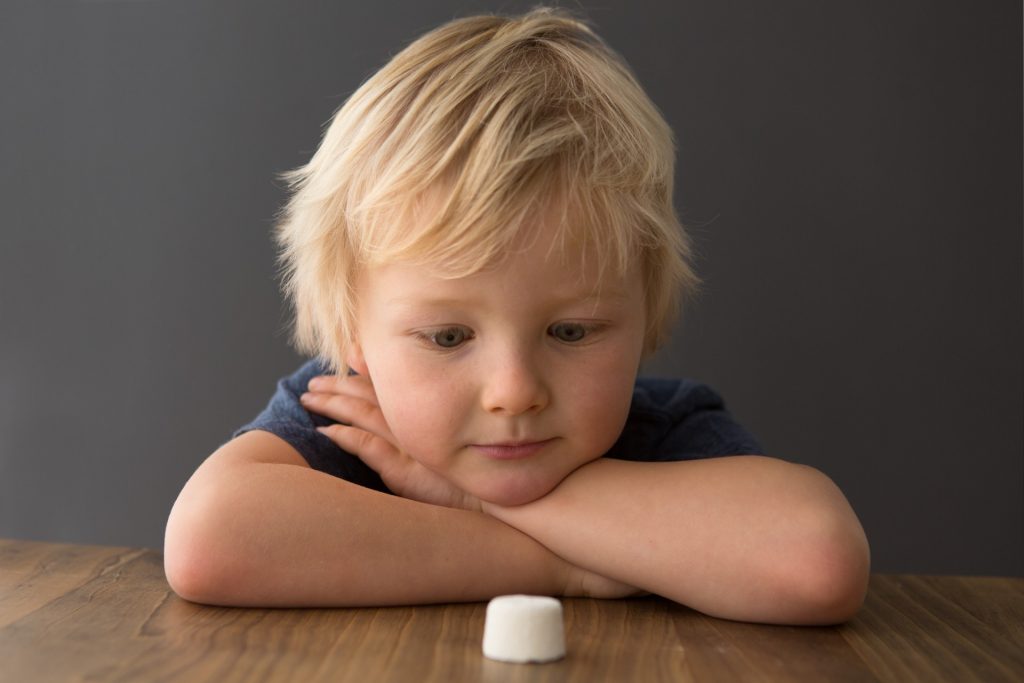Premiering in 1972 and designed by Walter Mischel, The Marshmallow Experiment attempted to show that delayed gratification could be achieved and that there was immense value in exhibiting self-control. Mischel believed that the skills we use for self-control allow us to avoid temptations throughout life, enabling children, adolescents, and adults to achieve higher success. These experiments also supported that using self-control becomes muscle memory, so the more practice, the stronger the ability to do it again. Aligned with these trains of thought, martial arts’ foundation is one of repetition, practice, and muscle memory. Maybe this is why self-control is a fundamental aspect of any well-rounded martial arts training program.
Mischel’s experiments revealed that self-control is integral in managing emotions. Delayed gratification, which requires self-control, helps people achieve goals. In preschool-aged children, where Mischel focused his studies, 70% could not avoid the temptation to eat the marshmallow once the researcher left the room, no matter how badly they wanted the second treat. The brain development of impulse control comes later for most children, which is why most families are challenged with self-control in younger children. Martial arts are a go-to for families looking for a healthy atmosphere that focuses on developing self-control.
Helping Children Learn Self Control
Learning self-control is about managing what Mischel called \”hot emotions.\” This means displaying ample resistance power to fight temptations long enough, practicing delayed gratification, and realizing a longer-term reward. The great news is that every child can learn self-control, even if your child would have gobbled the first marshmallow! Parents can be a part of teaching their children self-control and better equipping them for a successful and happy future.
Trust
To help children learn greater self-control, trust must be established. Feeding a child when hungry and changing a dirty diaper establish trust between a child and a parent. This “knowing” that they will be provided for builds trust, so they trust it will happen when they are promised something in the future. This confidence allows children to release stress and worry about if they will get what they are promised. In stressful situations, children learn to have patience and that they can self-soothe their anxiety when they know their value based on the acceptance and trust of a parent.
Modeling
All parents and other influential adults in a child\’s life should model de-escalation for children, teaching them how to calm down when their brain is faced with drama and escalated situations. Soothing and calming down are also part of muscle memory, so each time it happens, children are more equipped to do it again and ultimately able to self-soothe in stressful situations. A family-friendly martial arts studio offers incredibly qualified and dedicated instructors to lead children and serve as excellent role models in this area. Although parents can’t control every authority figure in their child’s life, there are choices of who your child spends time with outside of school, so do your due diligence and find the best martial arts dojo for your child.
Practice Makes (Almost) Perfect
As the brain naturally develops, its capacity increases. Practicing self-control in different situations allows children the opportunities to practice, practice, and practice. Think of self-control as a learned skill.
When a child gives up something for something they want more, it builds self-discipline. The choice must be self-motivated. It must be something the child wants more than another, and this can’t be forced. Motivation must be internal to be meaningful, so find small ways to incorporate these choices into your child’s daily routine. If you are working with a martial arts studio that partners with families, like SwiftKick Martial Arts, work with the instructor to identify goals requiring varying levels of self-control and self-discipline. Any advocates aligned with your plans to help your child is a big win!
A critical part of teaching self-discipline is encouraging your child when they hit roadblocks. Acknowledge that something is difficult but tell them hard things are worth the effort and that you support them completely.
Empathy for the Win
Parents can encourage children by showing empathy when they face adversity and discomfort. Waiting can seem terrible for children, and parents have an incredible opportunity to teach patience and self-distraction to overcome the struggle to wait. Yelling at a child to wait and be patient sends the opposite message of what it sounds like. Children who are just told to wait think the parent or trusted adult is holding out on them and keeping something from them they need. Again, this triggers a survival and urgency that make controlling emotional outbursts and having healthy self-control near impossible.
Although the research data from Mischel’s experiments have been taken out of context in many cases, the bottom line is that children who can practice self-control will have greater success achieving goals throughout life. Although some children seem to have an easier go at this task, every child can learn self-control using some examples above. Whatever it takes, kids are worth whatever we invest!

